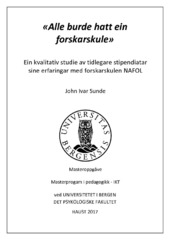| dc.contributor.author | Sunde, John Ivar Olsen | |
| dc.date.accessioned | 2018-01-30T09:50:57Z | |
| dc.date.issued | 2017 | |
| dc.date.submitted | 2018-01-29T23:00:02Z | |
| dc.identifier.uri | https://hdl.handle.net/1956/17297 | |
| dc.description.abstract | National research schools are defined as one strategy to increase the quality of the doctoral education in Norway, by offering an enhanced professional environment for PhD students in selected research domains. In this master thesis I have focused on a case-study of The Norwegian National Research School in Teacher Education (NAFOL), to examine how former research fellows experienced their participation in the research school. The aim of this thesis is to get a deeper understanding of the social practices and contexts that are established in NAFOL, and how the research school affects the professional development of the doctoral students. Data is collected from semi-structured qualitative interviews with eight previous research fellows from various university colleges and universities in Norway, all of whom have participated in NAFOL during their doctoral education. The theoretical framework for the study is based on a socio-cultural approach to learning. In particular, Lave and Wenger's (1991) theory of legitimate peripheral participation in communities of practice is a key contribution to understanding how research fellows and old-timers in the academic community cooperate to establish an arena where the research fellows can develop their academic skills. One key finding is that former fellows place great emphasis on the professional and social outcome of the community that is established between the fellows in the research school. Another important finding is that more participants feel that they establish a shared responsibility in the research school to contribute to other fellow students' academic development. I have argued that the main objective of the research school is based on a mutual understanding of a shared responsibility and the social practices that are established with the purpose of supporting each other professionally and socially. In addition, this thesis identifies how different thresholds and a form of tacit knowledge in the doctoral education prevent research fellows from gaining insight into important knowledge about the academic environment they seek to be part of. This thesis shows that other fellow students in the research school play an important role in mediating tacit knowledge in the doctoral education, and lowering the threshold for what is legitimate to discuss in an academic environment. | en_US |
| dc.description.abstract | Nasjonale forskarskular er definert som ein av strategiane for å auke kvaliteten på doktorgradsutdanninga i Noreg, ved mellom anna å tilby eit forsterka fagleg fellesskap for doktorgradsstudentar i utvalte fagområde. Denne studien tek utgangspunkt i Nasjonal forskerskole for lærerutdanning (NAFOL) som eit case for å undersøkje korleis tidlegare stipendiatar har erfart å delta i ein forskarskule. Formålet med studien er å gi ei djupare forståing av dei sosiale praksisane og kontekstane som blir etablert i forskarskulen, og som stipendiatane opplever har hatt betyding for deira tilvere som doktorgradsstudentar og arbeid med doktorgradsavhandlinga. Datamaterialet i studien byggjer på semistrukturerte kvalitative intervju med åtte tidlegare stipendiatar frå ulike høgskular og universitet i Noreg, som alle har vore deltakarar i NAFOL i stipendiatperioden. Det teoretiske rammeverket for studien er forankra i eit sosiokulturelt perspektiv. Her er særleg Lave og Wenger (1991) sin teori om legitim-perifer deltaking i praksisfellesskap eit sentralt bidrag for å forstå korleis stipendiatane og faglege nestorar i forskarskulen etablerer eit felles læringsfellesskap. Studien viser mellom anna at dei tidlegare stipendiatane legg stor vekt på det faglege og sosiale utbytet dei har fått frå fellesskapet som blir etablert mellom stipendiatar i forskarskulen. Eit anna sentralt funn er at fleire av deltakarane opplever at dei etablerer eit felles ansvar i forskarskulen for å bidra til andre stipendiatar sin akademiske utvikling. Eg har argumentert for at det er forståinga av eit felles ansvar, og dei sosiale praksisane som blir etablert med formål om å støtte kvarandre fagleg og sosialt, som er fundamentet for læringsfellesskapet i forskarskulen. Vidare identifiserer denne studien korleis ulike tersklar og ei form for taus kunnskap i doktorgradsutdanninga hindrar stipendiatar i å få innsikt i viktig kunnskap om det akademiske miljøet dei søkjer å bli ein del av. Her viser denne studien at andre stipendiatar i forskarskulen fyller ein viktig funksjon overfor kvarandre i å mediere ei form for taus kunnskap i forskarutdanninga, og senke terskelen for kva som er legitimt å diskutere i eit akademisk miljø. | en_US |
| dc.language.iso | nno | eng |
| dc.publisher | The University of Bergen | eng |
| dc.subject | forskerskole | eng |
| dc.subject | høyere utdanning | eng |
| dc.subject | stipendiat | eng |
| dc.subject | doktorgrad | eng |
| dc.subject | forskarskule | eng |
| dc.subject | NAFOL | eng |
| dc.subject | akademisk utvikling | eng |
| dc.subject | Phd | eng |
| dc.subject | høgare utdanning | eng |
| dc.title | "Alle burde hatt ein forskarskule". Ein kvalitativ studie av tidlegare stipendiatar sine erfaringar med forskarskulen NAFOL | eng |
| dc.title.alternative | "Everyone should have a research school" | eng |
| dc.type | Master thesis | |
| dc.date.updated | 2018-01-29T23:00:02Z | |
| dc.rights.holder | Copyright the Author. All rights reserved | eng |
| dc.description.degree | Masteroppgåve i pedagogikk IKT | |
| dc.description.localcode | PED396 | |
| dc.subject.nus | 724112 | eng |
| fs.subjectcode | PED396 | |
| fs.unitcode | 17-42-00 | |
